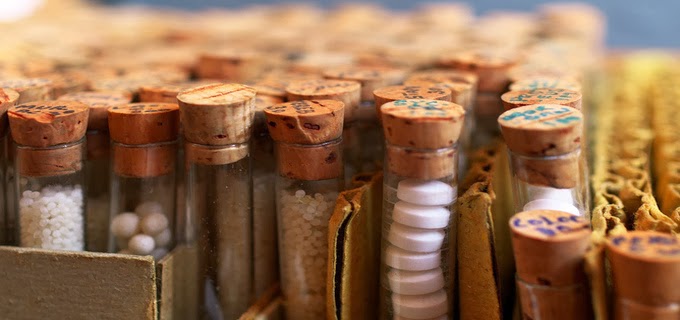This in general is the introduction of Colchicum. Now we
will describe its symptoms related to the individual organs of the body as follows: The
face: The face becomes swollen, the skin feels tingly. The cheeks
become red and sweaty. The temperament is of anger, like Chamomilla. The
stomach: Regarding the disorder of the stomach, the tongue burns and
the teeth ache. The mouth is dry with the feeling of intense thirst. The smell
of food, especially that of fish being cooked can cause severe nausea, so much
so that the patient becomes unconscious. The stomach either feels very hot or
extremely cold.
The
abdomen: The abdomen becomes distended with wind due to severe intestinal cramping. The extreme type of distension
in the abdomen is found in cattle like cows, buffalo, sheep and
horses (after they have been fed fodder containing Hydrocyanic Acid). When
a similarly severe distension is found in human bodies, a few
pellets of Colchicum in homoeopathic from will actually work like
magic. The effect is so apparent and certain that even the staunch
opponent of homoeopathy cannot deny it. The kind of severe abdominal distension mentioned above compels the farmer to call for a
veterinary surgeon to pierce the abdomen of the animal with a knife
to let out the air, but most often the animal is always at the point of death.
It has to be immediately slaughtered before it dies. Unfortunately, the scientists
of today still cannot understand the effectiveness of this remedy in potency
200 or 100 which practically does not contain any material substance of the
medicine, but produces an undeniably certain effect. The
back: There is pain in the lower part of the back radiating down to
both the hips. The pain feels better on resting or on applying local pressure.
The
skin: Rosy red spots form over the skin and there is tendency towards
urticaria. In addition to severe abdominal distension and cramping, the patient
passes jelly-like discharge with the stools and this is associated with
tenesmus. Such patients commonly suffer from dysentery in the autumn season.
The stools contain large pieces of the broken down inner lining of the
intestines in the form of small pieces of tape.
There is paralysis of the function of the large gut, which
is of temporary nature. This results in the inability to excrete in spite of feeling
the urge. As the patient strains himself without success, other physical means
need be adopted to relieve the constipation.
Rheumatic pains develop in the hands, feet, arms and the legs affecting
mostly the joints. The rheumatic pains are fleeting in nature and become worse
at night. The typical gout involves the big toe and the surrounding soft
tissue. The overlying skin becomes wet, markedly swollen, shiny and
hypersensitive to touch, even the touch of cloth over it. Such patients cut
their shoes around the big toe to keep it exposed so that the pain does not
aggravate too much while walking.
The
urine: When the urine becomes scanty and is of deep brown colour
mixed with blood, the joint pains become greatly aggravated. The
heart: If the diarrhoea is attempted to be suppressed with strong allopathic
medicines, the heart may be afflicted and difficulty in breathing will ensue.





